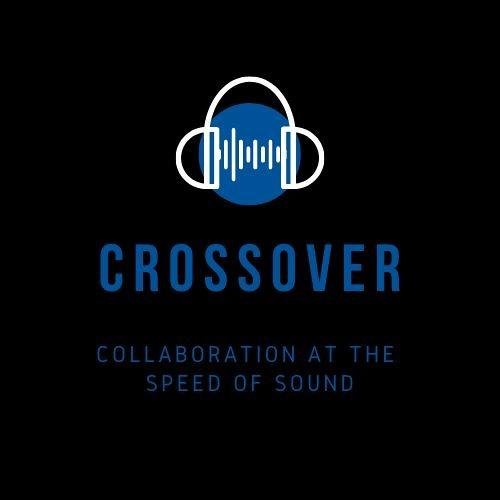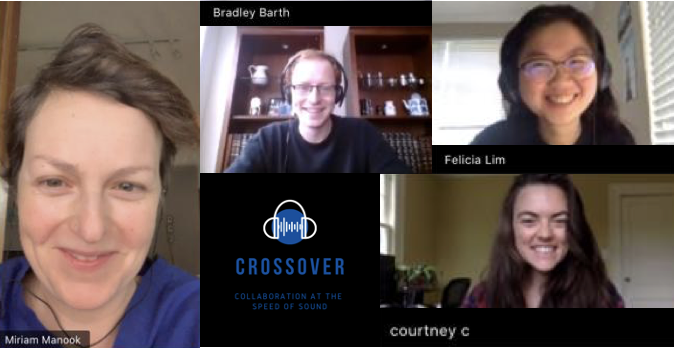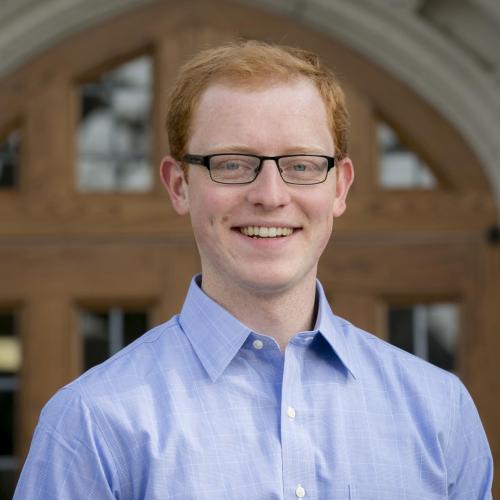
Blog
Crossover: Collaboration at the Speed of Sound

Duke prides itself on a university culture that encourages interdisciplinary collaboration amongst faculty and students alike. This support has materialized in the form of institutes, study programs, and initiatives that are available to students of various levels and faculties. Perhaps the most well-known opportunities include Bass Connections, Versatile Humanists, and Duke Engage. These efforts seem to pay off; students and faculty frequently cite interdisciplinary collaboration as one of their major reasons for choosing to study and work at Duke University.
In many ways, the Emerging Leaders Institute (ELI) is a product and champion of interdisciplinary collaboration. For example, our ELI team spans broad disciplines: Miriam is a postdoctoral associate and surgeon-scientist in the Duke Transplant Center; Bradley is a Ph.D. candidate in the Biomedical Engineering department; Felicia is a Ph.D. candidate in the Pharmacology and Cancer Biology department; Courtney is a Master’s student in Fine Arts in Dance. Despite our different backgrounds and programs, we agreed that the interdisciplinary culture was both a key attraction to Duke and an amorphous entity, meaning different things to different people.

Our first meetings were ecstatically excited, engaging, and frankly frustrating. All this can be seen in this image accidentally captured by a Duke photographer! The business of how a disparate team comes together was evidently on display, with a deadline and the weight of expectation looming.
We were quick to realize that the university has provided ample resources, yet many students and postdocs were not aware of these resources and opportunities. Our first ideas ranged from compiling resources and advice in a handbook, packaging and advertising them as a toolkit, introducing and promoting walking meetings throughout campus between cross-disciplinary individuals, and even testing out ideas of a department-specific tour-guide to promote more movements and interactions between departments. However, despite all these ideas, we agreed that there was still something missing: our initial ideas were too impersonal or impractical.
Until Miriam came up with the idea of a podcast!
A podcast captured our imagination as a format that could both stand alone or be part of a series. It could be a platform to engage, discuss, describe and signpost the graduate student and postdoc community toward more successful interdisciplinary collaborations.
The idea to create a podcast united our team with a new level of energy. First, we decided on the name of the podcast. We started by putting all our ideas on the wall. Then, we workshopped names and taglines to one another. This creative session led by Courtney was a fun way to explore rabbit holes of word associations, while defining the nature and tone of the podcast. Eventually, we decided on a name to represent our vision and the focus of the podcast: Crossover: Collaboration at the Speed of Sound.
Our own collaboration for Crossover
We leveraged the expertise in the group: Courtney recommended the Podcast 101 class given by Michael Betts II through Duke Create. Bradley and Felicia attended and acquired important tips, tricks and an appreciation of the editing process. Bradley swiftly and effectively took on editing, while Miriam took on the narrative arc of the podcast, squeezing interviews into cross-campus walks. We then decided on potential future episode themes.
Our process wasn’t always straightforward, although it was enriching. We workshopped with one another, learned to express our ideas more clearly and to listen to others’ ideas and inputs. We humbly realized that our diverse backgrounds had been encouraging us to use distinct or specific approaches. Thus, we had to re-learn to work in the context of an interdisciplinary team. This podcast is a representation of what interdisciplinary collaboration can be. It is the embodiment of what we hope we can do with such collaborations. In the end, we hoped that these collaborations can lead people to dance with joy the way we did when we found that jazz tune that we loved and made it our podcast episode introduction song. Take a listen to our first episode yourself!
Making allies for a future path

The short two months of ELI would never be enough time for us to generate all the Crossover episodes we had planned, and we wanted to find a way for our project to live on after the program ended. During our stakeholder and guest interviews, we discussed how to ensure that our podcast would continue and reach our target listeners. Among our various stakeholders and guests, Felicia identified a similar project headed by one of our guests: Ariana Eily, Ph.D. Dr. Eily had compiled the various resources provided by the university and highlighted them through a new website called STEAHM@Duke. Crossover would be included as one of the resources listed in the website, with potential for it to be taken forward into a bright future.
Unfortunately, we didn’t consider that the future might include a global pandemic. The momentum of the project was halted by the COVID19 pandemic; suddenly the idea of walking and talking freely with academic collaborators seemed like a distant possibility. Even so, we recognize and celebrate the fantastic learning experience that we had through ELI. ELI has allowed us to re-discover ourselves, to improve upon our leadership skills, to acknowledge the diversity of our leadership styles, and to perform as effective, confident leaders.

Acknowledgements
Firstly, we would like to thank our main stakeholders: Edward Balleisen, Ph.D., Vice Provost for Interdisciplinary Studies; Maria La Monaca Wisdom, Ph.D., Director of Interdisciplinary Advising and Engagement; Hugh Crumley, Ph.D., Assistant Dean for Academic Affairs; Mary Klotman, M.D., Dean of Duke School of Medicine; and Jacqueline Looney, Ed.D., Senior Associate Dean for Graduate Programs and Associate Vice Provost for Academic Diversity. There are many more stakeholders whom we have interviewed that we are not able to name here, but we still thank you for your responses and answers to our questions.
We would also like to thank our podcast interviewees: Zachary Fitch, M.D, Annette Jackson, Ph.D., Chris Nicchita, Ph.D., Ariana Eily, Ph.D., and Muath Bishawi, MD, MPH. Thank you for giving us your time and allowing us to record our interviews. Your inputs, ideas, and advice have been diligently noted in our podcast and we hope that our listeners would find it as useful as we do.
We would also like to thank Michael Betts II for his very effective podcast class, as well as Kevin MacLeod for providing sound we used for our podcast.
Lastly, we would like to extend our gratitude to the facilitators of the program: Melissa Bostrom, Ph.D., Kristin Murphy, Ph.D., and Tony Laffoley. We have learned so much under your guidance, counsel, and leadership. Thank you for making all of this possible.
Author

Miriam Manook, Ph.D.
Postdoctoral Associate, Duke Transplant Center
Miriam Manook is a postdoctoral associate in the Duke Transplant Center. As a surgeon-scientist her focus of interest is to expand the possible transplant options for sensitized patients. At Duke, she is studying donor specific immunological memory responses. She received her Ph.D. from King’s College, London, and is a higher surgical trainee with a specialist interest in kidney transplantation. Miriam is proud to have initiated a transplant partnership which seeks to develop and support transplantation in Armenia. Outside her professional career, homeschooling has been her greatest challenge.

Bradley Barth
Ph.D. candidate, Biomedical Engineering
Bradley Barth received a B.S. from Cornell University in 2015. As a Ph.D. candidate in Dr. Warren Grill’s laboratory, he is investigating sacral nerve stimulation as a treatment for gastrointestinal motility disorders. In his research, Bradley has developed computational models, implantable electrode arrays, and intravital imaging techniques to probe the peripheral and enteric neural circuits regulating colonic motility. Beyond the laboratory, Bradley has been involved with the Scientific Research and Education Network, connecting STEM researchers with educators to disseminate cutting-edge science and improve science literacy in K-12 schools.

Felicia Lim
Ph.D. candidate, Molecular Cancer Biology
Felicia Lim is a fourth-year Ph.D. student in Molecular Cancer Biology. Her research focuses on how hormones affect our immune system and how this influences their ability to fight cancer cells. She also participates in the Global Health Doctoral Certificate Program as she is interested in using her expertise in research to enter science diplomacy and global health. In her spare time, she enjoys reading, listening to music, and hiking.

Courtney Crumpler
Master's student, Master of Fine Arts in Dance: Embodied Interdisciplinary Praxis
Courtney Crumpler is a member of the inaugural cohort of the Master’s of Fine Arts in Dance. She is interested in the intersection of art and social justice, with a specific focus on individual and collective movement practices in public spaces. Before coming to Duke, Courtney worked as a political organizer, multidisciplinary artist, researcher, and translator for five years in Brazil. She graduated from Princeton University in 2013 and is the recipient of a Fulbright research fellowship. Courtney is the recipient of a Vice Provost for the Arts Fellowship for the 2019-20 academic year.